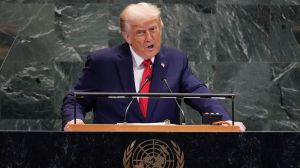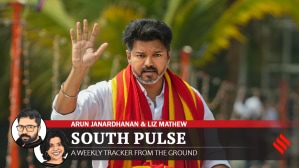Ambassador drives home
FROM the barracks of Harvard University to the White House, via Chanakyapuri, Robert Blackwill’s been on such a long journey. But after...

FROM the barracks of Harvard University to the White House, via Chanakyapuri, Robert Blackwill’s been on such a long journey. But after a mere two years in India, as America’s ambassador returns later this month to the innermost circle inside the Beltway — as a strategic planner in charge of Afghanistan, Iraq and Iran to US National Security Advisor Condoleezza Rice — he circumscribes the changing image of the world’s largest democracy in the heart of the most powerful one.
The British, mindful about the role they had played in Kashmir in 1947, were more circumspect, even though most doubts about the overwhelming participation of the Kashmiri electorate were washed away in subsequent reports in the Western press. Most interesting was the reaction in Islamabad.
Within 24 hours, the US ambassador to Pakistan Wendy Chamberlin was summoned by the Pakistan foreign office. She was summarily asked what business it was of Blackwill’s to pronounce judgement on the Kashmir elections. What did he know about what had happened? Did he realise the implications of his words?
Of course, Blackwill knew what he was doing. He also knew the Pakistanis knew he had direct access to the White House, which would in turn imply the US President himself was not only aware but also approved of his Indian envoy’s actions.
In retrospect, it was the diplomacy of Robert Blackwill rather than that of Deputy Secretary of State Richard Armitage — who had travelled to the sub-continent in early June 2002 to separate the ‘‘warring twins’’ — that helped India save substantial face with its own people. Especially after New Delhi had shot its bolt by mobilising its armies on the Pakistan border after the December 13, 2001, terrorist attack on Parliament.
In the heat and dust of Indian politics, often muddied with the monsoon-like downpour of too many opinions, the truth is often tough to decipher. Whether India truly intended to go to war with Pakistan in the summer of 2002, or was the mobilisation on the border — redoubled with the strength of rhetoric after the Kaluchak massacre of Army jawans, women and children on May 14 — only intended to frighten the Americans with their own favourite ‘‘nuclear flashpoint’’ scenario, so that Washington would in turn persuade Islamabad to back down, will probably be debated forever.
According to one view, Blackwill was in on New Delhi’s plans to scare — and stare — down Pakistan. Were this fantastic scenario to be true, it would add resonance to the remark that the ‘‘hearts of the Indian establishment and the US envoy really beat like one’’. Shorn of the dramatic imagery, Blackwill truly believed in the Indian line that ‘‘cross-border terrorism’’ must completely cease. He said as much.
The only problem was that back in Washington, the State Department’s view of South Asia was pitched at a slightly different angle. Secretary of State Colin Powell trusted his pointperson in the South Asia bureau Christina Rocca to run the line. That is, after 9/11, to wage the war against Osama bin Laden and the Al-Qaeda in Afghanistan, General Pervez Musharraf of Pakistan must be a central American ally. If Musharraf turned a blind eye to the terrorism that crossed the Line of Control, so be it.
Most ambassadors would have struggled hard to try and change the wind. Blackwill, too, often sent warning cables home, emphasising that Washington couldn’t afford to be seen to be ‘‘too cool’’ about terrorism, that New Delhi might to use force as if to prove its point. The State Department often thought he was ‘‘overdoing’’ the scare scenario. This February, Rocca actually confronted Foreign Secretary Kanwal Sibal with the ‘‘evidence’’. Sibal strenuously denied the allegations.
And so for the past two years, Blackwill simply shifted direction to the National Security Council led by old friend and comrade Condoleezza Rice. That was where the action clearly was. India was to return to the White House map.
Blackwill soon realised that if the ‘‘bad old days’’ — epitomised by American sanctions after India’s nuclear tests in 1998 — were to end, he would have to win over key players in the capital. Then external affairs minister Jaswant Singh was an early friend, as was Principal Secretary and National Security Advisor Brajesh Mishra — who had made himself acquainted with Rice even before Bush won the presidential election — and Deputy Prime Minister L K Advani.
Each time a major Indian leader visited Washington, Blackwill put his reputed association with Bush on the line. The first time that happened was in April 2002, when Jaswant called on Rice in the White House and Bush ‘‘dropped in’’. By June 2003, Mishra and Advani had breached those 20 long yards from Rice’s official quarters to the Oval Office.
The events of September 11, 2001 — and subsequently, the October attack on the Kashmir legislature and on Parliament in December — helped break the ice with Advani. In the months that followed, one Kashmiri terrorist group, the Harkat-ul-Ansar, was outlawed and others kept on the watchlist. Blackwill pushed Washington to pressure Pakistan to close down its terrorist camps.
But with terrorism against India hardly ceasing even as he prepares to return home, the US envoy is believed to have acknowledged more than once his failure to live up to the Pat Moynihan phrase on terrorism. The first and most important reply to evil is to stop it.
Soon, one initiative was leading to another. When Bush announced that he was going to abandon the Anti-Ballistic Missile treaty, the cornerstone of the Cold War nuclear doctrine, and replace it with his National Missile Defence scheme, Europe went ballistic. But Jaswant and India were immediately supportive.
When 9/11 happened, it brought the two countries closer than they’d ever been. Since, whether its been cooperation on carbon sequestration, nuclear safety or non-dual use high technology transfer, joint military exercises or a $120 million fund to fight AIDS, the Indo-US honeymoon has never been better. No wonder Blackwill will be at least half happy as he takes the flight home.
Photos



- 01
- 02
- 03
- 04
- 05




























